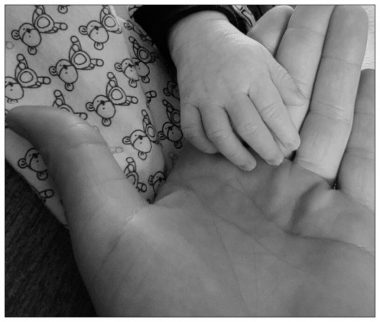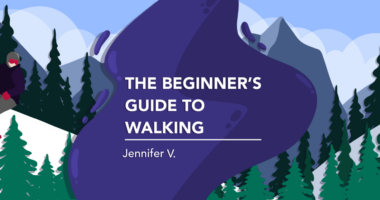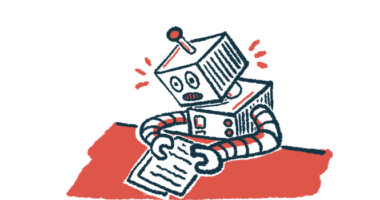Thoughts on Being a Disabled Grandparent

In early April, I became a grandmother (Gigi) for the first time. Reaching this important milestone gave me pause. In the months leading up to the baby’s birth, I thought a lot about what kind of grandmother I would be.
Phoenyx was born just 16 days after my 50th birthday, so while I’m a relatively young grandma, I am also a disabled one. I was born with a hearing impairment that has only worsened over the years. Five years ago, I got my first set of hearing aids, which I wear in both ears.
I have neuromyelitis optica (NMO), which has caused extensive damage to my spinal cord, and two types of arthritis, so I live with significant chronic pain. Two years ago, I was diagnosed with osteoporosis, the result of more than a decade of daily steroids combined with a biologic to help keep NMO attacks at bay. This combination of diseases and conditions led me to becoming a mobile wheelchair user just over a year ago.
By the time my grandson is old enough to have memories of me, he will only know me as disabled. I have mixed feelings about that. I think about the things I will never be able to do with him, like sit on the floor to play or take him hiking in the mountains or canoeing on a lake. This makes me sad, because I have always been an active person with an adventurous, risk-taking side, and he will never get to experience this side of me.

My grandson Phoenyx’s tiny little hand in mine. (Photo by Lelainia Lloyd)
On the flip side, I am also someone who grew up with disabled grandparents. Both my paternal grandmother and maternal grandfather were deaf. My paternal grandmother wore hearing aids at a time when the technology was terrible. Even with them in, she couldn’t understand what I was saying most of the time.
My maternal grandfather lost his hearing working with heavy machinery. Despite the entire family wishing he would get hearing aids so that we wouldn’t have to yell to communicate with him, he never did.
Gramps was a diabetic who started having strokes before I was born, so I only ever knew him in varying stages of unwellness and with increasing increments of disability. He was never one to complain about his circumstances, and he just got on with life.
Every time he had another stroke, we would be called to his bedside because his doctor didn’t think he would make it. Yet somehow he would rally, recover, and return home and life would go back to normal. He was tough and kept going, no matter how bad things got.
I also had a close friend who was a grandparent figure in my life, despite not being a blood relation. She was confined to bed and unable to leave her home because of severe angina. She was a gifted artist, and I started spending time with her as a friendly visitor when I was only 5. She nurtured my love of reading and writing, and taught me about the Group of Seven, who were Canadian landscape painters in the early 20th century, which ignited my interest in art.
Having grandparents with disabilities gave me a positive perspective about what it meant to be disabled. Having never known them any other way, disability was the norm, just another state of being and not something to be feared or pitied. I benefited from seeing how they creatively solved any challenges they were met with, and they unknowingly gave me a blueprint of how to live my own life with disabilities.
Where outsiders saw only their disabilities, I saw strength and resilience. They taught me to have patience and empathy for others, and to simply love people for who and what they are. They made me a better human being.
When I think about the relationship Phoenyx and I will have, I know that it’s normal to grieve the things I will never be able to do with him. I’ve realized that I don’t remember the things my own grandparents couldn’t do with me, but rather all the things they did. That list is as wide as it is deep, and they were everything I needed and more.
So, maybe I can be at peace with not being the able-bodied version of me if it means my grandson will get to keep the most important parts of me: the me who cares deeply for the well-being of others, the me who spends every waking minute working toward leaving this world a better place, the me who believes, even in the worst situations, that if you can find something to laugh about, you can survive it, and the me who doesn’t just survive being disabled but has found a way to thrive. May he be better for it.
***
Note: Neuromyelitis News is strictly a news and information website about the disease. It does not provide medical advice, diagnosis, or treatment. This content is not intended to be a substitute for professional medical advice, diagnosis, or treatment. Always seek the advice of your physician or other qualified health provider with any questions you may have regarding a medical condition. Never disregard professional medical advice or delay in seeking it because of something you have read on this website. The opinions expressed in this column are not those of Neuromyelitis News or its parent company, Bionews, and are intended to spark discussion about issues pertaining to neuromyelitis optica spectrum disorder.








Heather
Thank you for this! I’m anticipating the birth of a grandchild and recovering from my eighth surgery. I know I will have to have a unique relationship with this wee one and your story was very encouraging! Thank you!